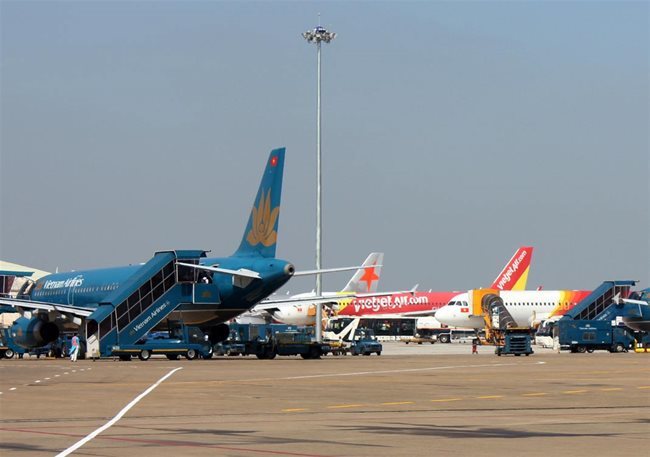give Vietnam an opportunity to move out of the group of developing countries?
 |
| Vietnam should utilize resources for infrastructure planning and development, clear bottlenecks for growth, and enhance management capacity and policy transparency - PHOTO: ANH QUAN |
The National Assembly will debate and consider the ratification of the EU-Vietnam Free Trade Agreement (EVFTA) during its sitting this month. The legislative decision has great significance, especially when EU countries are re-opening their economies and many enterprises are seeking new markets to overcome hardship early after a slump due to Covid-19.
The EVFTA will be the 13th effective FTA with Vietnam participation since 1993. The country is negotiating three other FTAs, including the Regional Comprehensive Economic Partnership (RCEP) Agreement, the FTA between Vietnam and the European Free Trade Area (EFTA) comprising Switzerland, Norway, Iceland and Liechtenstein, and the Vietnam-Israel FTA. Vietnam has never participated so actively in international free trade and engaged so deeply in global integration as such.
However, the most enthusiastic information is probably the fact that Vietnam together with two other countries, South Korea and New Zealand, has been invited to discuss with the Quadrangle (Quad), which comprises the United States, Japan, Australia and India, issues like vaccine development, challenges due to citizens stuck in relevant countries, trade coordination and restructuring of the supply chain to minimize impacts on the global economy. With the invitation for the participation of Vietnam, New Zealand and South Korea from March 20 this year, the Quad is now termed the Quad Plus.
The Quad came into birth in 2004 when the United States, Japan, Australia and India established the Regional Core Group, but it fell into oblivion from 2008 and re-gained attention in late 2017 when U.S. President Donald Trump launched the free and open Indo-Pacific strategy to replace the Asia-Pacific Pivot as the U.S. core policy for Asia to maintain the important role of the U.S. security and national interest in the region.
The core target of the new strategy is to build a quadrilateral alliance comprising four big countries (the United States, Japan, Australia and India) to restrain and contain the rise of China in the Indo-Pacific region; to gain dominance and control in the region; and to ensure free and fair trade, an open investment environment, effective state oversight and free navigation so as to maintain regional peace and prosperity.
According to analysts, the establishment of this economic prosperity network after U.S. President Donald Trump’s withdrawal from the Trans-Pacific Partnership (TPP) Agreement two years ago is aimed to counter China-led RCEP which is expected to be signed this year and its Belt and Road Initiative (BRI) which is challenging the U.S. leadership in the Indo-Pacific region.
On its part, China thinks that through the Quad Plus, the United States wants to move the supply chain out of China as quick as possible, and this is unbeneficial for her.
To seize the opportunity
The fact that Vietnam, the only nation in the group of developing countries which has been invited to join the Quad Plus to date, may be a surprise to quite a few people. However, this is a big opportunity for Vietnam, in view of the FTAs which the country has signed over the past years, and her strong attraction of international investment capital flows, deeper participation in the global supply chain and trade, rising role and position on the international arena, strategic geographical location in the region, and elevated and deepened relationship with the Quad in general and the United States in particular.
Since the start of the Sino-U.S. trade war and recently the Covid-19 outbreak, Vietnam has attracted big attention from the international community, and U.S. President Donald Trump has many times mentioned the country through his tweets. A year ago, Trump warned of a flight of investors in China whose new destination may be Vietnam. More recently, in early April he thanked Vietnam for facilitating and approving the delivery of personal protective equipment to the United States to meet the urgent demand of its medical personnel.
The close relationship with big countries through agreements and the relation network will benefit Vietnam greatly if the country can take advantage of opportunities. Vietnam’s political security and economy can be better ensured when the country can diversify partners and markets, reducing heavy reliance on a certain market. Vietnam can also continue to boost foreign investment attraction, improve labor skills and competitiveness, and increase her internal force.
According to the U.S. News & World Report, Vietnam ranks 8th in the list of the world’s best economies for investment in 2019, up 15 notches from the 23rd position in 2018. The consulting firm A.T. Kearney ranked Vietnam 6th among 30 countries with potential and investment attraction in the global retail area.
This is also an opportunity for Vietnam to enhance her national brand and narrow the income gap with developed countries. According to economists, Covid-19 can slow down some economies but it is also an opportunity for others to rise if their governments have measures to cope with risks and take advantage of the opportunities brought about by the pandemic.
In its May report, the World Bank stated that Vietnam is a promising destination for factory relocation from China after the country has made unusual achievements and been successful in the fight against Covid-19. Samir Dixit, CEO of Brand Finance in Asia-Pacific, thinks that Vietnam should not waste the opportunity to build the national brand by proving the capacity to produce items urgently needed in the world at this time. Prime Minister Nguyen Xuan Phuc has recently said, “Covid-19 is a pandemic but it is an opportunity for development if Vietnam has good State administration, good trade and good cooperation.”
Appropriate reform and approach
To seize this big opportunity, analysts argued that Vietnam should continue to boost institutional reform, focus on healthcare and education development, ensure sufficient high-quality manpower for the next phase of development and select investment projects with high knowledge content and technology, as it is seen as the biggest ever opportunity to attract foreign investment, not only from South Korea, Japan and some other countries but also possibly from big U.S. corporations like Apple.
Along with these efforts, Vietnam should utilize resources for infrastructure planning and development, clear bottlenecks for growth, and enhance management capacity and policy transparency. Ousmane Dione, the World Bank country director for Vietnam, said the country should take stronger measures, such as boosting disbursement of investment funds, especially for public investment, in addition to accelerating the digitalization process in the aftermath of the pandemic. Eric Sidgwick, country director of the Asian Development Bank in Vietnam, thought that Vietnam should make further institutional reform to support innovation. A more favorable legal corridor will help the country develop services both intensively and extensively.
Nevertheless, some precautions should be taken into account. First, the capital flight from China is caused by the trade war and the pandemic, but part of the reason is many projects have come to the termination stage and China does not want to expand them because of the low profit and position in the value chain; so investors have to find other countries for relocation. Therefore, it is of prime importance to select investment projects.
Second, the U.S. promotion of its Indo-Pacific strategy would inevitably clash with China’s BRI, which analysts argued that could place the region in constant stress and rivalry, especially in “hotspots” like the East Sea, the East China Sea, the Taiwan territory and the Korean Peninsula, which has increased arms races and caused more complex developments in the region.
Third, the U.S. presidential election will have results in early November. In case Trump loses in the election and a new president wins, would the Indo-Pacific strategy or the Quad Plus program remain in priority and be continued? It should be noted that Trump removed the TPP which Obama had pursued for many years out of his agenda after he won the presidential election.
Even in the case Trump is re-elected president, it’s not likely that this program will be promoted, as the possibility that it is used to attract votes for his re-election is not ruled out.
Therefore, Vietnam should have an appropriate strategy and approach in regional cooperation to take advantage of opportunities and ensure national interests but not to fall into the interest rivalry between powers. SGT
Trieu Duong

Coronavirus 'a devastating blow for world economy'
World Bank President David Malpass says billions of people will have their livelihoods affected.

Is an interest-rate cut enough to recover VN economy?
Within two months, the State Bank of Vietnam (SBV) slashed interest rates twice to support the economy.
 Would the movement of the international capital flow together with the re-arrangement of the global supply chain since the start of the Sino-U.S. trade war and especially under the impact of the Covid-19 pandemic
Would the movement of the international capital flow together with the re-arrangement of the global supply chain since the start of the Sino-U.S. trade war and especially under the impact of the Covid-19 pandemic